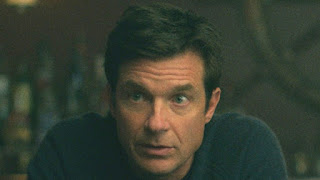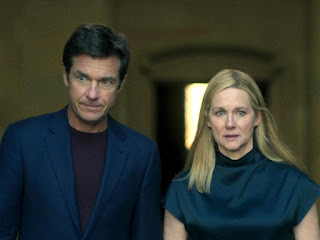The Season 4 (the last season of TV drama Ozark) is officially finished. And it seems there are quite a few things some fans would have wanted to change about its heartbreaking conclusion. The most important, probably, Ruth Langmore's death at the hands of Camila Navarro (the ruthless sister of Omar Navarro, boss of a Mexican drug cartel). Sadly I think it felt inevitable, due to Ruth's self-destructive bent during her last days, shown very effectively by Julia Garner. Ruth Langmore's affective bond with Marty Byrde (Jason Bateman), her renewed friendship with Rachel Garrison (Jordana Spiro), and her longing to escape the Langmore curse made her demise even sadder to accept. Many fans of Ozark probably looked forward to a final comeuppance for Marty and his wife Wendy (Laura Linney). But Ruth's actual death wasn't directly related to the Byrdes. Ruth had killed Camila's son Javi, and the Byrdes tried to placate Ruth's wrath, but the young Byrdes' mentee had lost her sanity after learning her vulnerable cousin Wyatt had been killed by the cartel. The Byrdes knew they couldn't save Ruth or they all would have gotten killed by Camila's henchmen.
At the beginning of Ozark Martin "Marty" talked to the viewers about economics: "Money as a measuring device. That which separates the haves from the have-nots. You see, the hard reality is how much money we accumulate in life is not a function of who's president or the economy or bubbles bursting or bad breaks or bosses. It's about the American work ethic. The one that made us the greatest country on Earth. Patience. Frugality. Sacrifice. What do those three things have in common? Those are choices. Money is, at its essence, that measure of a man's choices. Half of all American adults have more credit card debt than savings. 25% have no savings at all. And only 15% of the population is on track to fund even one year of retirement. Suggesting what? The middle class is evaporating? Or the American Dream is dead? You wouldn't be sitting there listening to me if the latter were true. I think most people just have a fundamentally flawed view of money. Is it an intangible? Security or happiness, peace of mind."
Stanislaw Ulam had been a member of the Manhattan Project (that produced the first nuclear weapons during World War II), and once challenged Paul Samuelson (the first American economist to win the Nobel Memorial Prize in Economic Sciences) to name one theory in all of the social sciences that was both true and nontrivial. Samuelson responded with David Ricardo's theory of Comparative Advantage: "That it is logically true need not be argued before a mathematician; that is not trivial is attested by the thousands of important and intelligent men who have never been able to grasp the doctrine for themselves or to believe it after it was explained to them."
Marty Byrde started laundering money for a drug cartel because he saw it all as a mere business of supply and demand, which operated in his view not very different from Purdue Pharma's shady practices. Marty had suggested this idea of cooperating with a Mexican drug cartel to his seemingly bipolar wife Wendy, thinking only about the potential benefits and taking for granted his low-profile behind these illicit enterprises. Although Jason Bateman was formidable and dryly funny as Marty, for me, it's Laura Linney as Wendy who made this show worthwhile. Her astoundingly vivid and unforgettable performance is truly deserving of an Emmy at the next celebration of the 74th Emmy Awards (September 12, 2022).
Wendy Byrde is the dark soul of Ozark, my favorite character of the show. Laura Linney is capable of etching on our memory each moment of doubt, mental anguish, courage, and manipulative decisions that passed across Wendy's disturbing mind in impeccable dramatic fashion. Linney embodies Wendy Byrde's psyche through memorable thespian work, making Wendy into the most theatrically developed character in Ozark. At the end of Season 2, we witness how fast Wendy evolves from bored housewife into an egotistical, unpredictable, power-thirsty anti-heroine. In a recent interview with Harper's Bazaar, Linney explained: "She's a wildly complex character that you can't quite figure her out. Is she sociopathic or just emotionally immature? The authentic part of her is hard to pin down."
Wendy teaches her son Jonah a hard-won lesson: “You need to grow up. This is America. People don’t care where your fortune came from.” And when trying to persuade Clare Shaw (CEO of Shaw Medical Solutions) to associate with the illicit Navarro cartel, Wendy affirms: “It’s the only way to make the bad mean something: Bury it. Pile good on top of good.” This scene is key to understand Wendy's unstable personality. Wendy had suffered as a kid from abusive treatment by her alcoholic father Nathan, which provoked in her a deep distrust towards the society; she thought the system had failed her when she most needed it. So now she is on a mission to prove that this system had always been broken, and in a twisted way to self-justify and compensate for her personal unhappiness.
As the Byrdes become a political power couple, many viewers might think their win-at-all-costs ethos, their lack of moral scruples and metastasized hubris, would inevitably lead them to a terrible comeuppance for their amoral actions. The Byrde clan, according to some analytical critics, certainly seems to represent the complicity of a corrupt family with the systemic corruption rooted within the USA's capitalist system. But why then the Byrdes win in the end? The answer is a heightened sense of perseverance. The answer might be "Comparative Advantage." Or the answer might be reformulated as a question: are they really the bad guys? The FBI have made tricksy deals with Omar and Camila Navarro. The politicians voted by the average Joe are mostly corrupt. The reality is the Byrdes win because they are the smartest players in the capitalist game. They are soberer than their rivals and know exactly when the light fades down the tunnel. In fact, they have distinguished from other TV criminal characters by manipulating people who are often much worse than them. Article published previously as The Master Manipulators: "Ozark" Season 4 (Finale/Spoilers) on Blogcritics.




















No comments :
Post a Comment